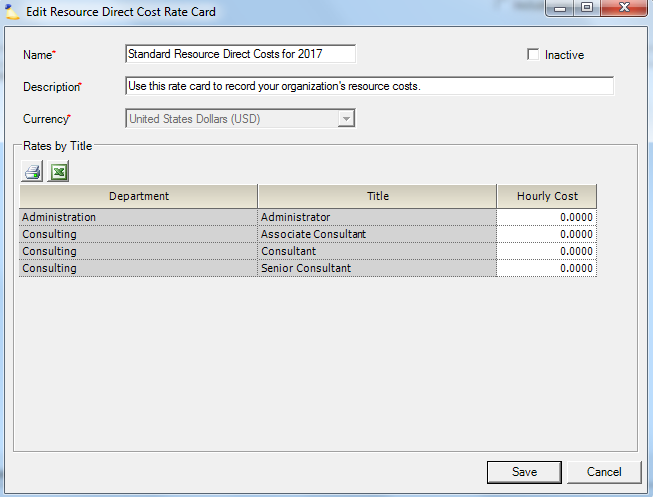Resource Direct Cost Cards (CQ)
Resource Direct Cost (RDC) rate cards are set in Rate Management | RDC Rate Cards.
RDC rate cards associate titles with hourly cost rates. Your account will start with one RDC rate card, which is named "Standard Resource Direct Costs for 2018" (the year will vary based on when you sign up). You may create as many RDC rate cards as needed. Many organizations use RDC rate cards to store average cost rates by job title to avoid keeping actual compensation data in Projector. Often they override the standard cost rates for temporary resources (e.g., contractors) because those resources are usually paid significantly more per hour than full-time resources.
By assigning an RDC rate card to a cost center you are establishing the hourly cost of the resources in that cost center. The currency of the RDC rate card is the currency in which Projector assumes you will compensate resources.
Cost rates should include expenses directly related to resources (e.g., salary and benefits), and not overhead (e.g., rent). These expenses should be divided by the number of expected working hours based on the RDC Basis Hours Formula. See table below. You can select the appropriate RDC basis hours formula for your company in System Settings | Reporting.
| RDC Basis Hours Formula | Example (assumes 8 hour days) |
|---|---|
| Normal Working Hours | 2080 (40 hours per week X 52 weeks per year) |
| Normal Working Hours - Holidays (assume 10 holidays) | 2080 - 80 = 2000 |
Normal Working Hours - Holidays - Time Off (assume 10 holidays and 15 days of time off) | 2080 - 80 - 120 = 1880 |
RDC rates may be overridden in three ways:
- Specify an RDC rate for a specific resource. As suggested above, this is often used for contractors. This can be time-phased.
- Specify a specific RDC rate at the project role level. This can be time-phased.
- Specify an RDC rate discount (positive or negative) for a combination of resource type and rate type. For example, you can specify an upcharge of 50% for overtime RDC rates for hourly resources, but no upcharge for salaried resources. This discount is applied after all other overrides have been taken into consideration. It is not time-phased and, because Projector doesn't currently allow specification of a default rate type per role, it doesn't affect the cost of scheduled (forward-looking) time.
